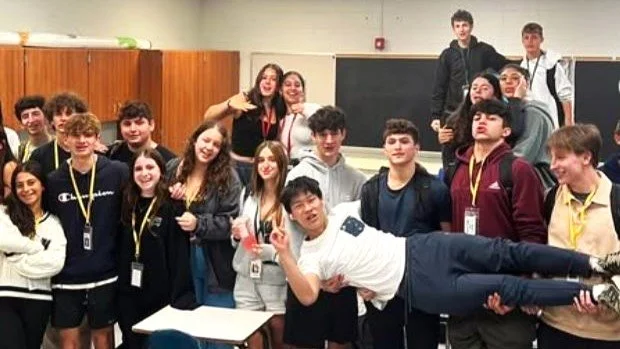A meeting of Northern New Jersey JSU teens
After October 7th, interest surged among public schools wanting to provide their Jewish students with greater opportunities to connect and share pride in their faith and support for Israel. With Russell Berrie Foundation funding, the New York/New Jersey NCSY is expanding the number of JSU clubs in Northern New Jersey high schools. In this Q&A, CEO Rabbi Gideon Black shared more on how these clubs give teens a safe space to embrace their Jewish identity and leadership potential.
Q: What are JSU clubs and how do they engage students?
A: JSU stands for Jewish Student Union. Started in 2002 with clubs in four Los Angeles public schools, today more than 400 JSU clubs operate across 29 states, serving more than 18,800 high school students. Every week, they give Jewish teens a safe space to explore Judaism, connect with peers, and bolster their Jewish identity and connection to Israel.
Weekly meetings combine social interaction with activities guided by a JSU staff member dedicated to that club, such as a holiday celebration or Jewish-themed discussion. This is paired with out-of-school programming that takes three main forms:
Rabbi Gideon Black
A weekly ice cream chill – Students meet at a local Dunkin Donuts or Baskin Robbins for free ice cream and to hang out with like-minded teens from nearby schools, where they also take part in a more thoughtful Jewish learning experience or dialogue.
Shabbaton – Shabbat dinners and retreats that take place four times a year, often hosted in local homes. Teens from across a region or state connect over a delicious meal and inspiring programming.
Relief missions – JSUs offer service-learning trips for groups of 15-20 teens to engage in rebuilding and recovery work in places struck by natural disasters. This year, we’ll likely offer trips to LA to aid recovery from the wildfires; at the same time, for example, relief missions continue in New Orleans to meet needs that remain from Hurricane Katrina. They’re also supporting Hurricane Helene recovery in North Carolina. “They offer leadership-building for teens who want to do selfless, hard work.”
Q: What do teens get out of participating?
A: Leadership is a central theme across all we do. We’re empowering teens to build their own communities. While each club is run by a JSU staff member and faculty advisor, it’s really the teens’ club. “As much as the teens can take ownership and drive the activities locally…that’s the real win.”
“At the end of the day, most teens are looking for joy, acceptance, and a safe place to connect with others who share their faith and identity. ”
Q: What impact is the clubs’ expansion having in Northern New Jersey?
A: We started establishing clubs in New Jersey around 2005. We now operate in 36 schools, with 15 of those running in Bergen County or other parts of North Jersey. Eight of those 15 launched since October 7th.
Before October 7th, we were in seven Northern New Jersey schools. Maybe we would’ve grown by one school per year. Our growth was organic and gradual – if we identified emerging interest, we would reach out to a principal to see if the school was a strong site for a club.
Now, we’ve more than doubled our reach in a little over a year. Since October 7th, 95% of clubs opening across the country have come about by teens reaching out proactively because they’ve experienced antisemitism and need additional resources, or they have a cousin in a club and they want that same opportunity in their school.
At the end of the day, most teens are looking for joy, acceptance, and a safe place to connect with others who share their faith and identity. Getting together once a week for an hour meets that need.
Ice cream chill with JSU teens from Tenafly, Cresskill, and Demarest
Q: Do any stories particularly stand out regarding the students’ leadership?
A: In December, a swastika was discovered in a student bathroom at Fair Lawn High School. After reporting the incident to law enforcement, one of the principal’s first steps was to invite the New Jersey JSU director and the school’s JSU club president, a senior, to help shape the school’s support of its Jewish community and response to this expression of hate.
JSU was asked to take a leading role in planning the school’s upcoming Holocaust Remembrance Day program, allowing JSU teens to educate their peers not only about the history of the Holocaust but also the recent resurgence of antisemitism and their experiences with prejudice at school. The club president felt empowered through JSU to stand up for the values of Jewish teens, educate other students, and lead the process of building bridges with different communities.
Q: Where do you see this work going?
A: “Every Jewish teen deserves a Jewish education and community. We want to partner with every secular public or private school in the U.S. that has a Jewish student population and is interested in having a Jewish culture club or affinity group.”
We want to build a framework for what it looks like for a teen to grow within JSU. Freshmen join and see juniors and seniors who have been active for two or three years – hopefully that inspires them to seek leadership roles. If 2024 was about expansion, 2025 and onward is about creating the special infrastructure needed to build and reinforce leadership among the teens involved in JSUs.



